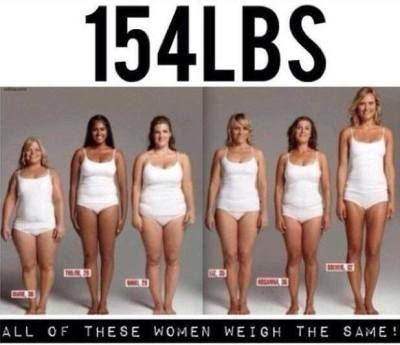How fat and muscle are different, and how they impact one’s weight loss journey ...
Many people don’t seem to fully realize how body composition plays into one’s weight overall. Body composition refers to the proportion of lean body mass (muscle, bone, and organs) to fatty tissues in your body. It gets more interesting, however, when we factor body composition into our weight, especially when we are trying to lose some weight.
Weight Loss & Body Composition
When it comes to weight loss, it’s important to understand that muscle is denser than fat, so as you lose fat and gain muscle, the number on the scale may not change as much as you expect. This is what leads to the fascinating phenomenon of – same weight, different body shape! This is also perhaps why someone who weighs themselves frequently may become frustrated or confused by constantly seeing weight fluctuations – because if we lose fat but gain muscle at the same time, the scale may not go in the expected direction. It’s important to focus on body composition changes rather than just weight loss, as you want to lose fat and maintain or even gain muscle. This will not only lead to a healthier, leaner body, but also a higher metabolism which can help with weight loss in the long term. Additionally, it’s important to note that the scale is not the only measure of progress, other metrics such as measurements, progress photos, and how clothes fit can give a more accurate picture of body composition changes.
Differences Between Muscle & Fat
Muscle and fat have the same volume but muscle is denser than fat, therefore one pound of muscle takes up less space than one pound of fat. Muscle is denser than fat in the human body because muscle tissue is denser and more compact than fat tissue. This is due to the fact that muscle tissue is composed of muscle fibers, which are tightly packed together and contain a high amount of water, protein, and various other substances.
In contrast, fat tissue is composed of adipocytes, which are large cells that store fat in the form of triglycerides. These cells are less dense and take up more space than muscle fibers, which contributes to the overall lower density of fat tissue. This difference in density can confuse someone seeking to lose weight because weight loss is often measured by changes in overall body weight, which can be misleading.
For example, if someone loses a significant amount of fat but gains muscle, their overall body weight may not change much, even though they have made significant progress towards their weight loss goals. This can be discouraging, and may make it difficult for them to stay motivated to continue their weight loss journey. It’s just something to keep in mind, and avoid confusion.
Easier to Gain Fat Than Muscle
It is generally considered easier to gain fat than lean muscle tissue. This is because the body finds it easier to store energy in the form of fat than to build muscle tissue. Additionally, it is typically easier to consume more calories than the body needs for energy and muscle growth, leading to fat gain, than it is to consume the optimal amount of nutrients and perform the necessary exercise to build muscle.
Gaining fat and gaining muscle are two distinct processes that involve different physiological mechanisms.
Gaining fat occurs when the body takes in more calories than it burns. These extra calories are stored in the body’s fat cells as triglycerides. Over time, as more and more triglycerides accumulate in the fat cells, the cells will expand and the person will gain weight. This process is often referred to as “positive energy balance.”
Gaining muscle, on the other hand, occurs when the body is exposed to physical stress, such as weightlifting or other resistance training. This stress causes tiny tears in the muscle fibers, which the body then repairs and rebuilds, resulting in an increase in muscle size and strength.
One reason that gaining fat might be easier than gaining muscle is that it requires relatively little effort. Consuming more calories than you burn can happen easily through a sedentary lifestyle and poor food choices.
In contrast, gaining muscle requires consistent and specific effort, such as regular weightlifting or other resistance training, along with proper nutrition. Additionally, muscle tissue is denser than fat tissue, so even if a person is gaining muscle and losing fat at the same time, it may appear that they are not losing weight.
Fat & Muscle Distribution In The Body
In the human body, fat and muscle are not physically interwoven. Fat is found in the subcutaneous layer, which is located just beneath the skin. There is also a “hidden fat” which is called visceral fat, and wraps itself around your organs, and is quite difficult to shed.
Muscle, on the other hand, is found in the deeper layers of the body, such as the skeletal muscle. Some muscles are closer to the surface, depending on how lean you are. For example, if you have extra fat on your belly, your abdominal muscles are obscured by the fat.
While the two are not physically interwoven, they are interconnected in that the amount of fat in the body can affect the amount of muscle, and vice versa. For example, having a higher percentage of body fat can lead to a lower percentage of muscle mass, and having a higher percentage of muscle mass can lead to a lower percentage of body fat. Additionally, the distribution of fat and muscle in the body can vary depending on factors such as genetics and lifestyle.
How The Body Sheds Fat
Even though fat and muscle are not interwoven, imagine your body is like a big pot of stew, when it comes to losing weight. You can’t just take a spoon and scoop out the potatoes or the carrots, can you? No, you've got to scoop out the whole thing. And that’s how it is with fat, too. You can’t just lose it from one specific spot on your body. Your body will burn it off where it wants to, not where you want it to. And just like a stew, it’s all mixed together and you will end up with a leaner, meaner version of yourself.
But you need to put in the work and be patient, just like it takes time to cook a good stew!


